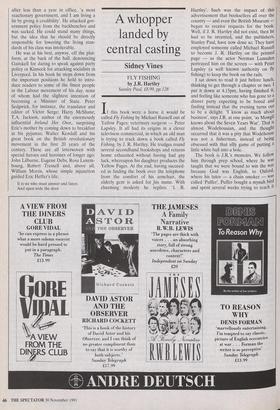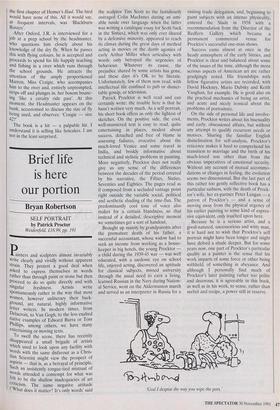A whopper landed by central casting
Sidney Vines
If this book were a horse it would be called Fly Fishing by Michael Russell out of Yellow Pages: veterinary surgeon — Peter Lapsley. It all had its origins in a clever television commercial, in which an old man is trying to track down a book called Fly Fishing, by J. R. Hartley. He trudges round several secondhand bookshops and returns home exhausted without having had any luck, whereupon his daughter produces the Yellow Pages. At the end, having succeed- ed in finding the book over the telephone from the comfort of his armchair, the elderly gent is asked for ,his name. With charming modesty he replies: 'J. R. Hartley'. Such was the impact of this advertisement that booksellers all over the country — and even the British Museum — began to receive requests for the book. Well, if J. R. Hartley did not exist, then he had to be invented, and the publishers, Stanley Paul, have now done so. They have employed someone called Michael Russell to become J. R. Hartley on the printed page — as the actor Norman Lumsden portrayed him on the screen — with Peter Lapsley (a well known authority on fly fishing) to keep the book on the rails.
I sat down to read it just before lunch, thinking to get through a chapter or two. I put it down at 4.15pm, having finished it, and feeling like someone who has gone to a dinner party expecting to be bored and finding instead that the evening turns out to be a delight. 'I know as much about business', says J.R. at one point, 'as Mowgii knows about the Seven Years War'. That Is almost Wodehousian, and the thought occurred that it was a pity that Wodehouse was not a fisherman, instead of being obsessed with that silly game of putting a little white ball into a hole.
The book is J.R.'s memoirs. We follow him through prep school, where he was taught that we were bound to win the war because God was English, to Oxford, where his tutor — a chain smoker — Was called 'Puffer'. Puffer bought a mynah bird and spent several weeks trying to teach it the first chapter of Homer's Iliad. The bird would have none of this. All it would say, at frequent intervals, was 'Blackburn Rovers'.
After Oxford, J.R. is interviewed for a Job at a prep school by the headmaster, who questions him closely about his knowledge of the dry fly. When he passes this with flying colours, he is accepted and proceeds to spend his life happily teaching and fishing in a river which runs through the school grounds. He attracts the attention of the amply proportioned Matron, Miss Craigie, who accompanies him to the river and, entirely unprompted, strips off and plunges in, her bosom bounc- ing 'like a cavalry ride past'. At this moment, the Headmaster appears on the bank, accustomed to discuss the size of fly being used, and observes: `Craigie — size 42?'
The book is a hit — a palpable hit. I understand it is selling like hotcakes. I am not in the least surprised.











































































 Previous page
Previous page